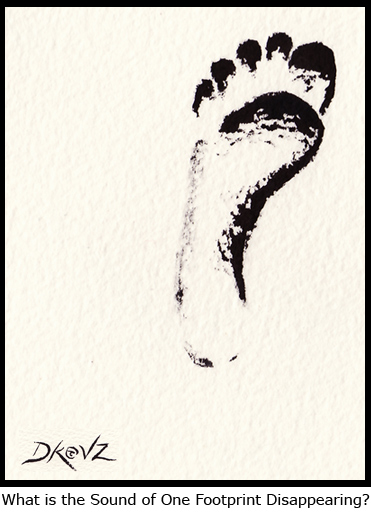What is the Sound of One Footprint Disappearing?

The Transformation of Tangible to Intangible
Sixty years ago the value of productivity and wealth was determined by the value of the tangible property you made or possessed. Whether it was houses, factories, manufactured products or portfolios the driving force measuring value was tangible property. Tangible property was the base of most government revenue from all sources other than income taxes. Even income taxes were indirectly driven by the wage paid for creating tangible property.
In the 1960’s that all began to change. Information technology was silently converting tangible property to the intangible with the value of the intangible determined by the value of the intelligence it contained and not the tangible property. Resources consumed and standards of living were going to be highly impacted.
A personal story that illustrates the transformative power of information technology centers on my purchase of two fax machines. In 1974 fax machines were a necessity for law practice. Until 1974 our firm used a variety of fax machines most of which required 4 to 10 minutes a page, often involved a messy wet output whose legible half-life was probably a month. After two months the transmitted copy crumbled or the writing disappeared. Not a good situation for a law firm receiving or sending documents that had to be read decades later. Xerox made a giant faxing breakthrough by developing a less-than-one-minute faxmachine. Being very frustrated by current faxing technology and somewhat enamored with new technology, I started the acquisition process.
Although we were in a quake proof new office building we hired a structural engineer to assure the office building owner that when this new marvel was put into place, it would not crash through the 8th floor and create an unplanned elevator shaft to the basement. Its footprint exceeded five square feet and when placed on the floor it came up to my chest. Its weight was measured in tons; it contained more than 18,000 feet of wiring and many large and small iron, steel and rubber parts. It cost in excess of $100,000 which was equal 1000 of my billable hours.
Today I have a fax machine on my desk in my home office that transmits 8 pages in less than a minute, weighs less than 5 lbs, has a footprint of less than a square foot, contains less than 100 feet of wiring, and costs $125. I can fix a paper jam and replace the blank paper without risking my hand or arms while standing upright. Oh, and it also functions as a telephone, answering machine and a plain paper copier. Its impact on my standard of living is that I own a machine that has four times the functions of Xerox’s magic machine and is 8 times faster. My new fax machine transformed tangible property costing $100k into intangible property costing $125. It consumes a fraction of one percent of the natural resources required for the big guy and only 1/5th of a billable hour to pay for it.




Bill’s insightful post inspired me to create a disappearing footprint to riff off his theme of the tangible moving to the intangible. Bill’s comparison of the two footprints is also right in tune with the concept of reducing carbon footprints.